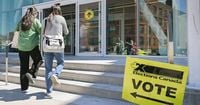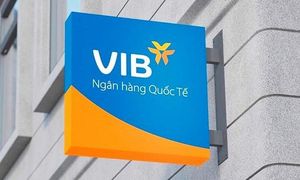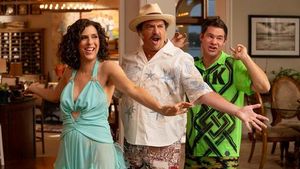MONTREAL — The Liberal Party of Canada is projected to secure a remarkable fourth consecutive term in government, a feat that is rare in Canadian politics. As of 11:25 p.m. on April 28, 2025, the Liberals were leading or elected in approximately 41 ridings across Quebec, compared to about 25 for the Bloc Québécois, and held an eight-point lead in the popular vote. Meanwhile, the Conservative Party was leading or elected in around 11 ridings, and the New Democratic Party (NDP) managed to secure one seat.
The Canadian Press decision desk has projected that the Liberals, under the leadership of Mark Carney, will form the next government. However, it remains uncertain whether they will achieve a majority or settle for a minority government, as they were not leading in enough seats nationwide to claim a majority at the time of the projections.
Political analyst Jeremy Ghio remarked, "Quebec is coming through for the Liberals. After a rough start in the Maritimes and a shaky one in Ontario, organizers on the ground are delivering where it counts. Key battlegrounds are breaking their way in Quebec." Despite this optimism, many observers noted that the overall national picture was still unclear.
By 11 p.m., several prominent Liberal figures had been re-elected, including Finance Minister François-Philippe Champagne, Foreign Affairs Minister Mélanie Joly, Canadian Culture Minister Steven Guilbeault, and Employment Minister Steven MacKinnon. Former minister Jean-Yves Duclos also retained his seat in Quebec City.
In a notable upset, the Bloc Québécois managed to unseat former Liberal minister Diane Lebouthillier in the riding of Gaspésie—Les Îles-de-la-Madeleine—Listuguj, where Bloc candidate Alexis Deschênes, a lawyer and former journalist, took the victory. Bloc leader Yves-François Blanchet was re-elected in his South Shore riding, as was Louis Plamondon, the longest-serving current member of the House of Commons.
Despite the Liberals' gains, the Bloc's performance in key regions, particularly around Montreal, has raised eyebrows. The Liberals were leading in several ridings around the island, including La Prairie—Atateken, traditionally held by the Bloc. Political observers consider this area a bellwether region.
Two star Liberal candidates, École Polytechnique survivor Nathalie Provost and former Quebec finance minister Carlos Leitão, also celebrated victories in ridings outside Montreal. The Liberals appeared poised to win close to 50 of Quebec's 78 seats, marking their best showing in decades.
However, the Conservatives were making inroads in and around Quebec City, potentially picking up a few seats beyond the nine they held at the dissolution of Parliament. NDP MP Alexandre Boulerice was re-elected in the Montreal riding of Rosemont—La Petite-Patrie.
Blanchet, facing a challenging campaign, expressed his anticipation for the results, stating he would be waiting impatiently to see if the Bloc met its objectives, though he did not specify what those goals were. Political analyst Antonine Yaccarini indicated that the Bloc needed to win at least 20 seats—down from the 33 they held at dissolution—to declare the campaign a success.
As the night unfolded, the political landscape continued to shift. The Liberals were projected to win a total of 172 seats to form a majority government, a number that seemed increasingly out of reach as the results came in. In Ontario, tight races were unfolding, with the potential for the Liberals to lose as many as 10 seats.
David Lametti, a former cabinet minister, acknowledged the division in Ontario, stating, "there's division out there," and emphasized the importance of uniting the party and the government under Carney's leadership.
Meanwhile, NDP incumbent Heather McPherson, projected to win her seat in Edmonton Strathcona, noted that voters appeared to be casting their ballots out of fear rather than hope. She commented, "New Democrats do better when people are voting out of a sense of hope and optimism," indicating a need for the party to regroup and hold the projected Liberal government accountable.
In a surprising twist, Conservative candidate Roman Baber was leading in the traditionally Liberal riding of York Centre, where incumbent Ya’ara Saks faced a tough battle. Volunteer Leonardo Lacroix noted the division among voters in the area, suggesting that even if Saks loses, the potential for a minority government could be seen as a victory for the Conservatives.
Former Deputy Prime Minister Chrystia Freeland, who resigned in December 2024, is projected to win her University-Rosedale seat. Freeland expressed her delight at the Liberal's success, stating, "People had totally written us off and right now you are talking about what the strength of our government will be." She praised Carney's campaign efforts, highlighting the palpable wave of patriotism that could help unite the country.
In the Green Party camp, co-leader Elizabeth May is projected to continue representing B.C.’s Saanich-Gulf Islands in the House of Commons. May, who has been a prominent figure in Canadian politics since 2006, celebrated her victory at her election watch party in Victoria, where she performed a duet with her husband and engaged with supporters.
As results continue to roll in, it is clear that the 2025 federal election has been a pivotal moment for many parties involved, with shifting allegiances and emerging trends that could redefine the Canadian political landscape in the years to come. This report by The Canadian Press was first published April 28, 2025, with updates continuing as the situation develops.




